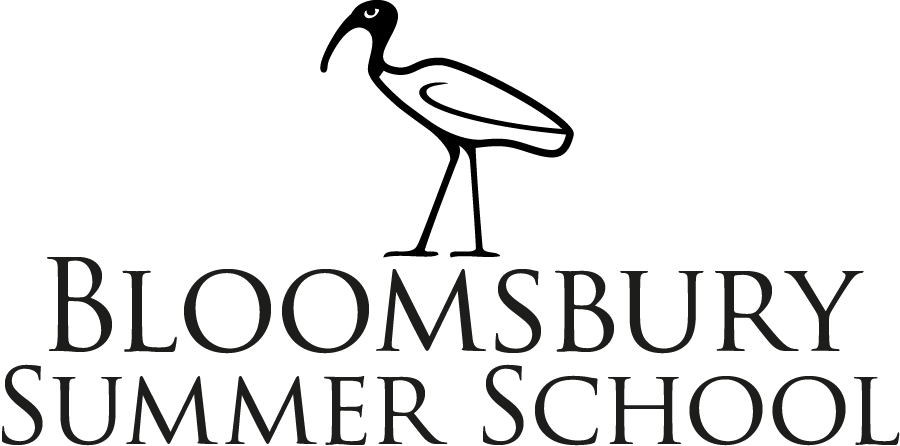
Bloomsbury Summer School

Fascinated by ancient civilisations?
We offer anyone with any level of knowledge, inspiring short courses on ancient Egypt and other areas of the ancient world.
Summer School 2020 – programme (archived)

Due to the COIVD-19 pandemic, the following courses were delivered online on their originally scheduled dates.
Monday 29 June to Friday 3 July 2020
Reading Coptic: On the margins of Coptic culture
Course Director: Dr Bill Manley (University of Glasgow)
This course will run as scheduled, but delivery will be online (via the video communication platform Zoom. Details provided upon enrolment).
Once again Bill Manley will be here with a course for old friends and newcomers, designed to build on your elementary skills in reading Coptic. This brand new course concentrates on exemplary groups of Coptic texts from the 4th century to the decades following the Arab invasion, including letters, narratives, biographies, legal papers, sermons and spells. You will be invited to study different points of grammar and apply them from day one in reading ancient texts, using notes specially written for BSS.
Note: You need not have taken the course Coptic: A Course for Beginners at BSS, but Reading Coptic assumes you do have some experience in reading Sahidic Coptic texts (as a rule of thumb you should be able to read a short narrative including the Past Tense and Circumstantial forms.) However, do not worry about the intensity: there will be plenty of time for supervised practice and for questions and answers with your tutor. On the other hand, if you have taken Reading Coptic with us previously, you will find all-new content in this latest course.
Monday 6 July to Friday 10 July 2020
Reading Hieroglyphs: Khufu and the magicians
Course Directors: Dr José Ramón Pérez-Accino (University of Madrid) and Dr Bill Manley (University of Glasgow)
This course will run as scheduled, but delivery will be online (via the video communication platform Zoom. Details provided upon enrolment).
As usual, we have set aside a course for those of you who love to discover pharaonic Egypt by reading the ancient texts. This year we are delighted to offer a brand-new course based on the Tales of Khufu and the Magicians, recorded on Papyrus Westcar (Berlin 3033) and featuring the royal family of the 4th Dynasty. We will also read some New Kingdom funerary inscriptions which illuminate the Tales’ engaging beliefs about this world and the meaning of death.
Note, in response to ever-increasing demand and your recent feedback, Khufu and the Magicians will be run in two groups to allow for smaller class-sizes and increased enrollment—though the content will be the same for each group.
Our Reading Hieroglyphs courses presume you already have good experience of reading Middle Egyptian hieroglyphic texts. Normally, we would expect you to have taken both of the BSS courses Hieroglyphs for Beginners (first stage) and Hieroglyphs: The next step (second stage) beforehand, though this is not mandatory. As a guide, before you come along you should have worked through How to Read Egyptian Hieroglyphs (see below) to the end and be comfortable reading any of the texts in it. At the same time, do not worry about the intensity of this course: during the week, there will be plenty of time for your own supervised work and for contact with your tutors.
- Timetable
- Recommended reading
- Course Directors: Pérez-Accino / Manley
NEW COURSE
Tuesday 14 July 2020 (1-day course)
A Taste of Hieroglyphs (for beginners)
Course Director: Dr Bill Manley (University of Glasgow)
This course will be delivered online (via the video communication platform Zoom. Details provided upon enrolment).
For those of you looking to take our beginners hieroglyphs course when normal life resumes – and for those of you who have been wondering whether to take the plunge – this one-day course will show you the basics behind reading Egyptian hieroglyphs, and give you a taste of what we do at Bloomsbury Summer School. The course assumes you have no prior experience in the subject but aims show you how to read some pharaonic monuments on display in some of the world’s most famous museums by the end of the day.
New course
Monday 13 July to Friday 17 July 2020
Unlocking Late Egyptian: An Introductory Class to the Language of New Kingdom Egypt
Course Director: Dr Luigi Prada (University of Oxford)
This course will be delivered online (via the video communication platform Zoom. Details provided upon enrolment).
When we approach the study of the ancient Egyptian language normally begin by tackling Middle Egyptian. This language phase and its literary production were regarded by the ancient Egyptians themselves as embodying the classical period of their cultural production, and as such have always figured prominently in modern Egyptological training, too. However, there is much more to ancient Egypt’s written records and literary production, which is expressed in a later phase of the language – Late Egyptian. Closer to what was the spoken language of the time, Late Egyptian was first embraced as a written language in the Amarna Period, and later on, during the Ramessid Period, it gained an increasingly high status, replacing Middle Egyptian (or coexisting with it) in several literary genres.
This course will provide you with the unique opportunity to read directly the literary masterworks and daily-life documents from the New Kingdom (and later periods). All texts will be read in hieroglyphic transcription. The first day will be spent on an overview of Late Egyptian grammar, focusing on its main features and differences from Middle Egyptian. The rest of the week will see us read a selection of original texts – some in full, some as long excerpts – to give the participants a comprehensive experience of the treasures of Late Egyptian textual production. These will include several narrative compositions (e.g. Horus and Seth and the Report of Wenamun), samples of love poetry, religious compositions, and daily-life documents such as private letters.
This class includes sessions taught on high-resolution images of written artefacts from the British Museum and UCL’s Petrie Museum of Egyptian Archaeology, offering students a chance to read Late Egyptian – remotely – from original manuscripts. Please note: this class is not intended for complete beginners in the study of the ancient Egyptian language. Participants will be expected to have a good knowledge of Middle Egyptian, so as to enable the language instruction in Late Egyptian to be given by comparison and contrast with the grammar of Middle Egyptian, and not from scratch. Should you be uncertain as to your knowledge level of Middle Egyptian, please feel free to contact the Course Director to discuss your case (luigi.prada[at]orinst.ox.ac.uk).
Monday 20 July to Friday 24 July 2020
Fifth Dynasty Solar Religion and the Sun Kings
Course Director: Dr Massimiliano Nuzzolo (Charles University, Prague)
This course will run as scheduled, but delivery will be online (via the video communication platform Zoom. Details provided upon enrolment).
Bringing the latest research from the field, Dr Massimiliano Nuzzolo will explore with you one of the most fundamental symbols of ancient Egyptian belief and practice – the sun. Early symbolic expression is associated with pyramid building, such as the great pyramid of Khufu at Giza. There is a specific period, however, when we see the development of a coherent vision of the sun cult, with a fully-formed system of belief in the afterlife and the introduction of new deities. The celebration of solar-related festivals becomes more common, along with the construction of unparalleled monuments for the joint cult of the Egyptian king and the sun god, especially sun temples. In this course, we will delve into this pivotal period religious innovation and coherence – namely, the Fifth Dynasty (c.2494 BCE–c.2345 BCE). We will examine textual, artistic, and architectural evidence, including material kept in both the Petrie Museum of Egyptian Archaeology and the British Museum. Dr Nuzzolo will present the latest findings from the archaeological fieldwork he has been conducting over the past 10 years at the sun temple of Niuserra at Abu Ghurab, the most intact surviving sun temple.
Monday 27 July to Friday 31 July 2020
An A–Z of Ancient Egyptian Statues
Course Director: Dr Campbell Price (University of Manchester)
This course will run as scheduled, but delivery will be online (via the video communication platform Zoom. Details provided upon enrolment).
In response to all the positive feedback following Dr Campbell Price’s well-attended course Ancient Egypt in 100 People for us last year, we are staging this new course by popular demand. Campbell will now take us into the rich and fascinating world of ancient Egyptian statuary – one of the most ubiquitous products of ancient Egyptian material culture. Lectures will examine the materials, quarrying techniques, transport, installation, activation, use, reuse, and later reception of this type of Egyptian sculpture. The course will also interrogate forms and contexts for sculpture over time, provide translation and analysis of the rich body of statue inscriptions (some previously untranslated into English), and offer a practical guide to recognising the dating and meanings of a range of statue types.
This course included sessions taught in The British Museum and UCL’s Petrie Museum of Egyptian Archaeology.


